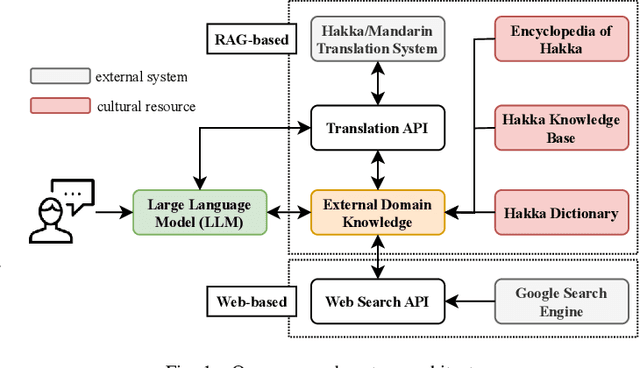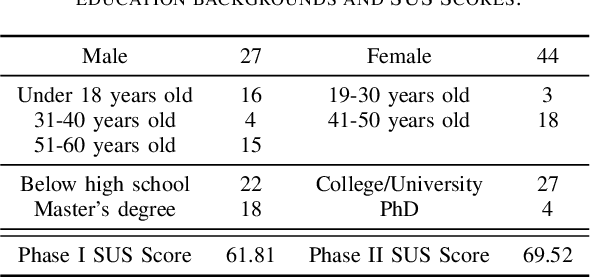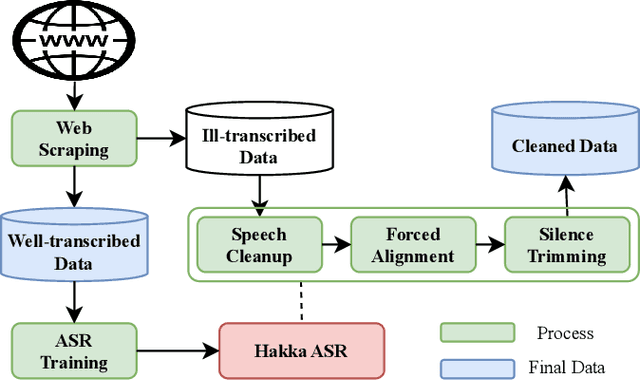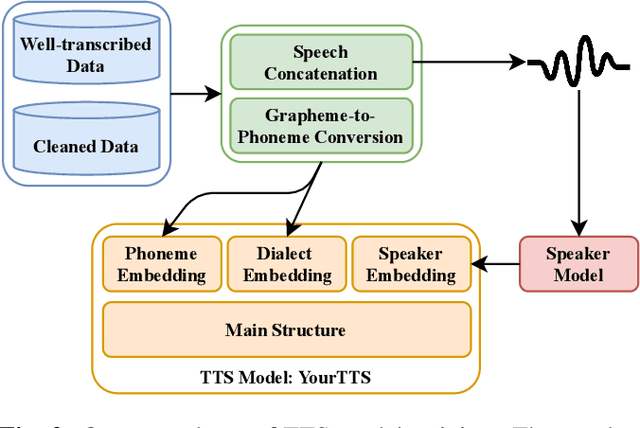Chen-Chi Chang
Enhancing Low-Resource Minority Language Translation with LLMs and Retrieval-Augmented Generation for Cultural Nuances
May 16, 2025Abstract:This study investigates the challenges of translating low-resource languages by integrating Large Language Models (LLMs) with Retrieval-Augmented Generation (RAG). Various model configurations were tested on Hakka translations, with BLEU scores ranging from 12% (dictionary-only) to 31% (RAG with Gemini 2.0). The best-performing model (Model 4) combined retrieval and advanced language modeling, improving lexical coverage, particularly for specialized or culturally nuanced terms, and enhancing grammatical coherence. A two-stage method (Model 3) using dictionary outputs refined by Gemini 2.0 achieved a BLEU score of 26%, highlighting iterative correction's value and the challenges of domain-specific expressions. Static dictionary-based approaches struggled with context-sensitive content, demonstrating the limitations of relying solely on predefined resources. These results emphasize the need for curated resources, domain knowledge, and ethical collaboration with local communities, offering a framework that improves translation accuracy and fluency while supporting cultural preservation.
Leveraging Retrieval-Augmented Generation for Culturally Inclusive Hakka Chatbots: Design Insights and User Perceptions
Oct 21, 2024

Abstract:In an era where cultural preservation is increasingly intertwined with technological innovation, this study introduces a groundbreaking approach to promoting and safeguarding the rich heritage of Taiwanese Hakka culture through the development of a Retrieval-Augmented Generation (RAG)-enhanced chatbot. Traditional large language models (LLMs), while powerful, often fall short in delivering accurate and contextually rich responses, particularly in culturally specific domains. By integrating external databases with generative AI models, RAG technology bridges this gap, empowering chatbots to not only provide precise answers but also resonate deeply with the cultural nuances that are crucial for authentic interactions. This study delves into the intricate process of augmenting the chatbot's knowledge base with targeted cultural data, specifically curated to reflect the unique aspects of Hakka traditions, language, and practices. Through dynamic information retrieval, the RAG-enhanced chatbot becomes a versatile tool capable of handling complex inquiries that demand an in-depth understanding of Hakka cultural context. This is particularly significant in an age where digital platforms often dilute cultural identities, making the role of culturally aware AI systems more critical than ever. System usability studies conducted as part of our research reveal a marked improvement in both user satisfaction and engagement, highlighting the chatbot's effectiveness in fostering a deeper connection with Hakka culture. The feedback underscores the potential of RAG technology to not only enhance user experience but also to serve as a vital instrument in the broader mission of ethnic mainstreaming and cultural celebration.
Benchmarking Cognitive Domains for LLMs: Insights from Taiwanese Hakka Culture
Sep 03, 2024Abstract:This study introduces a comprehensive benchmark designed to evaluate the performance of large language models (LLMs) in understanding and processing cultural knowledge, with a specific focus on Hakka culture as a case study. Leveraging Bloom's Taxonomy, the study develops a multi-dimensional framework that systematically assesses LLMs across six cognitive domains: Remembering, Understanding, Applying, Analyzing, Evaluating, and Creating. This benchmark extends beyond traditional single-dimensional evaluations by providing a deeper analysis of LLMs' abilities to handle culturally specific content, ranging from basic recall of facts to higher-order cognitive tasks such as creative synthesis. Additionally, the study integrates Retrieval-Augmented Generation (RAG) technology to address the challenges of minority cultural knowledge representation in LLMs, demonstrating how RAG enhances the models' performance by dynamically incorporating relevant external information. The results highlight the effectiveness of RAG in improving accuracy across all cognitive domains, particularly in tasks requiring precise retrieval and application of cultural knowledge. However, the findings also reveal the limitations of RAG in creative tasks, underscoring the need for further optimization. This benchmark provides a robust tool for evaluating and comparing LLMs in culturally diverse contexts, offering valuable insights for future research and development in AI-driven cultural knowledge preservation and dissemination.
VoxHakka: A Dialectally Diverse Multi-speaker Text-to-Speech System for Taiwanese Hakka
Sep 03, 2024



Abstract:This paper introduces VoxHakka, a text-to-speech (TTS) system designed for Taiwanese Hakka, a critically under-resourced language spoken in Taiwan. Leveraging the YourTTS framework, VoxHakka achieves high naturalness and accuracy and low real-time factor in speech synthesis while supporting six distinct Hakka dialects. This is achieved by training the model with dialect-specific data, allowing for the generation of speaker-aware Hakka speech. To address the scarcity of publicly available Hakka speech corpora, we employed a cost-effective approach utilizing a web scraping pipeline coupled with automatic speech recognition (ASR)-based data cleaning techniques. This process ensured the acquisition of a high-quality, multi-speaker, multi-dialect dataset suitable for TTS training. Subjective listening tests conducted using comparative mean opinion scores (CMOS) demonstrate that VoxHakka significantly outperforms existing publicly available Hakka TTS systems in terms of pronunciation accuracy, tone correctness, and overall naturalness. This work represents a significant advancement in Hakka language technology and provides a valuable resource for language preservation and revitalization efforts.
 Add to Chrome
Add to Chrome Add to Firefox
Add to Firefox Add to Edge
Add to Edge